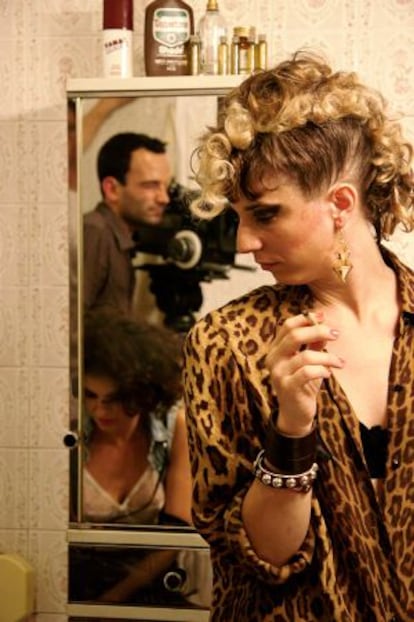When the party was still raging
A debut feature about disillusionment in 1980s Spain premieres at Locarno


El futuro (The future) is a film so sad that it is hard to believe that it takes place at a party — “A party so never-ending that when it becomes day 30 years have passed.” The movie, which premiered in the Signs of Life section of the Locarno Film Festival in Switzerland on Wednesday, is the feature debut of Luis López Carrasco, a member of filmmaking collective Los Hijos — one of the most interesting to have emerged in Spain in the last few years.
It begins with a blank screen over which you hear a radio broadcast: it is election night 1982 and Felipe González, now with absolute power in his hands, is announcing his proposals. He talks about definitively consolidating democracy, getting over the economic crisis and concluding the building of a state divided into regions. He also talks about modernization, progress, solidarity and uniting Spaniards.
González’s voice then cuts off and the silence begins, as does the party — “that immemorial pact between desperation and conformism,” as writer Rafael Sánchez Ferlosio condemned it in 1984.
The theme music fades in and out as we enter a city, an apartment, a night of youngsters in the 1980s. Inaudible conversations and music groups from before 1983, barely any of them famous. There are shadows lying in wait, black holes, but who’s worrying?
El futuro was born, like so many things these days, out of desperation. Back in 2011, López Carrasco, 32, had every door close on him that allowed him to live. “For the first time in my entire existence I could do absolutely nothing for my future,” he says. “I lost my job at the Filmoteca, they cut the subsidies and all the lines of financing for young entrepreneurs, all of the five plans I had to move forward failed, one after another. I was stuck at a dead end that was pure nothing. I started to get depressed...
That bit of home footage seems more eloquent than anything I have read”
“It was the idea of not having a future that made me think about a Spanish society in which there was one,” he continues. “I didn’t want to criticize that generation; in any case I envy them. Its biggest concern was being happy. I was like that, but at the hour of truth it doesn’t matter at all.”
Shot on 16 millimeter film and with low-cost production values, much to López Carrasco’s regret — “there is nothing more exclusive than guerrilla cinema” — El futuro plays with a documentary style “as if it were found footage from those years.” A detail from director Iván Zulueta’s 1980 film Arrebato gave him the key. “Perhaps it is very trite to talk about Arrebato, but it had a very big impact on me. In it you see a party in Super 8 that looks like a birthday in which [singer] Alaska, Almodóvar, Zulueta himself, and someone who looks like [filmmaker] Ricardo Franco, I don’t know, appear. That small bit of home footage to me seems more eloquent than anything I have read about those years. It reveals real happiness.”
The party, he explains, is a way of putting limits around the film and not a way of saying that the whole of Spanish society started dancing. He’s worried people might confuse the party with the so-called Movida Madrileña — the cultural explosion that followed the post-Franco Transition to democracy — which, on the other hand, represents the only finished tale from those years.
“I’m not interested in critiques of the Movida,” says López Carrasco. “I’ve always thought that there is a lot of jealousy on the part of those who weren’t a part of it. That’s why I think that it was time to get into the 80s. And also because it’s worth trying to make something out of the mess that was the Transition. It has passed from totem to taboo and in that way dialogue is not possible. Today’s savagery against the Transition to me seems dangerous. At the heart of it is a new cultural lobby against another older one. To me it all seems the product of a big tantrum.”
Tu suscripción se está usando en otro dispositivo
¿Quieres añadir otro usuario a tu suscripción?
Si continúas leyendo en este dispositivo, no se podrá leer en el otro.
FlechaTu suscripción se está usando en otro dispositivo y solo puedes acceder a EL PAÍS desde un dispositivo a la vez.
Si quieres compartir tu cuenta, cambia tu suscripción a la modalidad Premium, así podrás añadir otro usuario. Cada uno accederá con su propia cuenta de email, lo que os permitirá personalizar vuestra experiencia en EL PAÍS.
¿Tienes una suscripción de empresa? Accede aquí para contratar más cuentas.
En el caso de no saber quién está usando tu cuenta, te recomendamos cambiar tu contraseña aquí.
Si decides continuar compartiendo tu cuenta, este mensaje se mostrará en tu dispositivo y en el de la otra persona que está usando tu cuenta de forma indefinida, afectando a tu experiencia de lectura. Puedes consultar aquí los términos y condiciones de la suscripción digital.








































